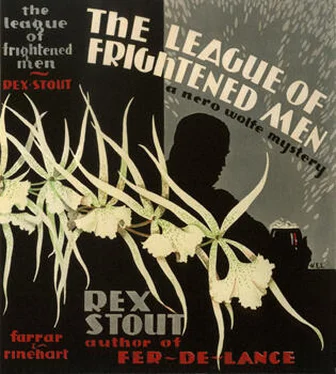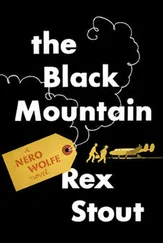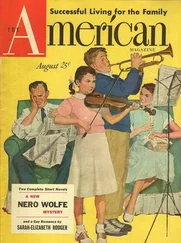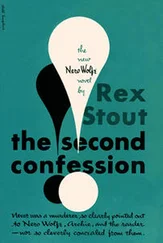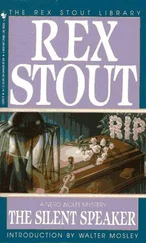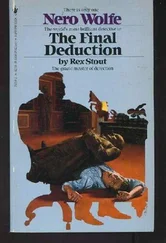“Yes, sir. Take my own line with her?”
“Any that suggests itself.”
“If I go up there I could take the list along.”
“No, mail it.” Wolfe was getting up from his chair. I watched him; it was always something to see. Before he got started for the door, I asked:
“Maybe I should know this, I didn’t get it. What was the idea asking her about the life insurance?”
“That? Merely the possibility that we were encountering a degree of vindictive finesse never before reached in our experience. Chapin’s hatred, diluted of course, extended from the uncle to the niece. He learned of the large sum she would receive in insurance, and in planning Hibbard’s murder planned also that the body would not be discovered; and the insurance money would not be paid her.”
“It would some day.”
“But even a delay in an enemy’s good fortune is at least a minor pleasure. Worth such a finesse if you have it in you. That was the possibility. And another one: let us say Chapin himself was the beneficiary. Miss Hibbard was sure he would kill her uncle, would evade discovery, and would collect a huge fortune for his pains. The thought was intolerable. So she killed her uncle herself — he was about to die in any event — and disposed of the body so that it could not be found. You might go into that with her this evening.”
I said, “You think I won’t? I’ll get her alibi.”
There was plenty doing Saturday evening and Sunday. I saw Evelyn Hibbard and had three hours with her, and got Saul and Fred and the other boys lined up, and had a lot of fun on the telephone, and finally got hold of Higgam the bank guy late Sunday evening after he returned from a Long Island week-end. The phone calls were from members of the league who had got the telegrams. There were five or six that phoned, various kinds; some scared, some sore, and one that was apparently just curious. I had made several copies of the list, and as the phone calls came I checked them off on one and made notes. The original, Hibbard’s, had a date at the top, February 16, 1931, and was typewritten. Some of the addresses had been changed later with a pen, so evidently it had been kept up-to-date. Four of the names had no addresses at all, and of course I didn’t know which ones were dead. The list was like this, leaving out the addresses and putting in the business or profession as we got it Monday from the bank:
Andrew Hibbard, psychologist
Ferdinand Bowen, stockbroker
Loring A. Burton, doctor
Eugene Dreyer, art dealer
Alexander Drummond, florist
George R. Pratt, politician
Nicholas Cabot, lawyer
Augustus Farrell, architect
Wm. R. Harrison, judge
Fillmore Collard, textile-mill owner
Edwin Robert Byron, magazine editor
L. M. Irving, social worker
Lewis Palmer, Federal Housing Administration
Julius Adler, lawyer
Theodore Gaines, banker
Pitney Scott, taxi-driver
Michael Ayers, newspaperman
Arthur Kommers, sales manager
Wallace McKenna, congressman from Illinois
Sidney Lang, real estate
Roland Erskine, actor
Leopold Elkus, surgeon
F. L. Ingalls, travel bureau
Archibald Mollison, professor
Richard M. Tuttle, boys’ school
T. R. Donovan
Phillip Leonard
Allan W. Gardner
Hans Weber
For the last four there were no addresses, and I couldn’t find them in the New York or suburban phone books, so I couldn’t ask the bank for a report. Offhand, I thought, reading the names and considering that they were all Harvard men, which meant starting better than scratch on the average, offhand it looked pretty juicy; but the bank reports would settle that. It was fun stalling them on the phone.
But the real fun Sunday came in the middle of the afternoon. Someone had leaked on Hibbard’s disappearance and the Sunday papers had it, though they didn’t give it a heavy play. When the doorbell rang around three o’clock and I answered it because I happened to be handy and Fritz was busy out back, and I saw two huskies standing there shoulder to shoulder, I surmised at first glance it was a couple of bureau dicks and someone had got curious about me up at Hibbard’s the night before. Then I recognized one of them and threw the door wide with a grin.
“Hello, hello. You late from church?”
The one on the right spoke, the one with a scar on his cheek I had recognized. “Nero Wolfe in?”
I nodded. “You want to see him? Leap the doorsill, gentlemen.”
While I was closing the door and putting the chain on they were taking off their hats and coats and hanging them on the rack. Then they were running their hands over their hair and pulling their vests down and clearing their throats. They were as nervous as greenhorns on their first tail. I was impressed. I was so used to Wolfe myself and so familiar with his prowess that I was apt to forget the dents some of his strokes had made on some tough professional skulls. I asked them to wait in the hall and went to the office and told Wolfe that Del Bascom of the Bascom Detective Agency was there with one of his men and wanted to see him.
“Did you ask them what they wanted?”
“No.”
Wolfe nodded, and I went out and brought them in. Bascom went across to the desk to shake hands; the other gentleman got his big rumpus onto a chair I shoved up, but nearly missed it on the way down on account of staring at Wolfe. I suspected he wasn’t overwhelmed by prestige as much as he was by avoirdupois, having never seen Wolfe before.
Bascom was saying, “It’s been nearly two years since I’ve seen you, Mr. Wolfe. Remember? The hay fever case. That’s what I called it. Remember the clerk that didn’t see the guy lifting the emeralds because he was sneezing?”
“I do indeed, Mr. Bascom. That young man had invention, to employ so common an affliction for so unusual a purpose.”
“Yeah. Lots of ’em are smart, but very few of them is quite smart enough. That was quite a case. I’d have been left scratching my ear for a bite if it hadn’t been for you. I’ll never forget that. Is business pretty good with you, Mr. Wolfe?”
“No. Abominable.”
“I suppose so. We’ve got to expect it. Some of the agencies are doing pretty well on industrial work, but I never got into that. I used to be a workingman myself. Hell, I still am.” Bascom crossed his legs and cleared his throat. “You taken on anything new lately?”
“No.”
“You haven’t?”
“No.”
I nearly jumped at the squeak, it was so unexpected. It came from the other dick, his chair between Bascom and me. He squeaked all of a sudden:
“I heard different.”
“Well, who opened your valve?” Bascom glared at him, disgusted. “Did I request you to clamp your trap when we came in here?” He turned to Wolfe. “Do you know what’s eating him? You’ll enjoy this, Mr. Wolfe. He’s heard a lot of talk about the great Nero Wolfe, and he wanted to show you haven’t got him buffaloed.” He shifted and turned on the glare again. “You sap.”
Wolfe nodded. “Yes, I enjoy that. I like bravado. You were saying, Mr. Bascom?”
“Yeah. I might as well come to the point. It’s like this. I’m on a case. I’ve got five men on it. I’m pulling down close to a thousand dollars a week, four weeks now. When I wind it up I’ll get a fee that will keep me off of relief all winter. I’m getting it sewed up. About all I need now is some wrapping paper and a piece of string.”
“That’s fine.”
“All of that. And what I’m here for is to ask you to lay off.”
Wolfe’s brows went up a shade. “To ask me?”
“To lay off.” Bascom slid forward in his chair and got earnest. “Look here, Mr. Wolfe. It’s the Chapin case. I’ve been on it for four weeks. Pratt and Cabot and Dr. Burton are paying me — that’s no secret, or if it was, it wouldn’t be for you after Monday. Pratt’s a sort of a friend of mine, I’ve done him a good turn or two. He phoned me last night and said if I wanted to hang my own price tag on Paul Chapin I’d better get a move on because Nero Wolfe was about to begin. That was how I found out about the telegrams you sent. I dusted around and saw Burton and Cabot and one or two others. Burton had never heard of you before and asked me to get a report on you, but he phoned me this morning and told me not to bother. I suppose he had inquired and got an earful.”
Читать дальше
